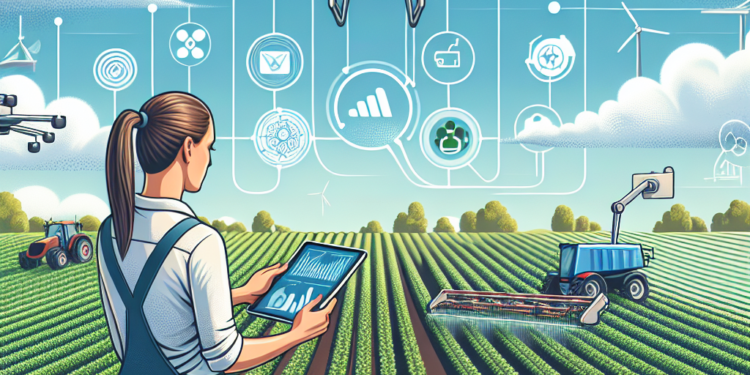Artificial intelligence (AI) is revolutionizing the agriculture industry by providing farmers with the ability to increase productivity, reduce costs, and improve efficiency. By analyzing large amounts of data and providing insights that were previously impossible to obtain, AI is transforming the way farmers manage their operations.
In this article, we will explore several case studies that showcase how AI is being utilized in agriculture to drive innovation and improve outcomes for farmers around the world.
The first case study we will explore is the use of AI in precision farming. Precision farming involves using data-driven technologies to optimize crop yields and reduce waste. AI plays a critical role in this process by analyzing data from sensors placed in the field, such as temperature, humidity, and soil moisture levels, to provide farmers with real-time insights into crop health and growth.
One example of this technology in action is FarmWise, a company that uses AI-powered robots to provide precision weeding services for farmers. These autonomous robots are equipped with cameras and sensors that can identify weeds and remove them without the need for herbicides, reducing the environmental impact of farming operations and increasing crop yields.
Another case study that showcases the power of AI in agriculture is the use of facial recognition technology to monitor livestock health. By analyzing facial characteristics and behavior patterns, AI can detect signs of illness or distress in animals and alert farmers to take action.
A company called Cainthus is using this technology to provide real-time monitoring of cattle health and behavior on farms. By analyzing data from cameras placed in barns and pastures, Cainthus can detect signs of lameness, stress, or disease in cattle, allowing farmers to address these issues before they become serious problems.
In addition to precision farming and livestock health monitoring, AI is also being used in agriculture to improve irrigation systems and water management. By analyzing weather patterns, soil moisture levels, and crop water requirements, AI can help farmers optimize their irrigation schedules and reduce water waste.
One example of this technology in action is the use of AI-powered drones to monitor irrigation systems in vineyards. By flying over the fields and analyzing data from sensors placed in the soil, these drones can provide farmers with recommendations on when and how much water to apply, leading to more efficient use of water resources and improved crop yields.
In addition to these case studies, AI is also being used in agriculture to improve crop forecasting and pest management. By analyzing historical data on weather patterns, pest outbreaks, and crop yields, AI can help farmers predict future trends and make informed decisions about planting, harvesting, and pest control.
One example of this technology in action is the use of AI-powered software to predict pest outbreaks in fruit orchards. By analyzing data on temperature, humidity, and pest populations, this software can alert farmers to potential infestations and recommend appropriate control measures, reducing the need for chemical pesticides and minimizing crop damage.
Overall, AI is revolutionizing the agriculture industry by providing farmers with the tools they need to increase productivity, reduce costs, and improve sustainability. By analyzing large amounts of data and providing real-time insights, AI is helping farmers make better decisions and achieve better outcomes for their operations.
As these case studies demonstrate, the potential for AI in agriculture is immense, and the technology is only just beginning to scratch the surface of its capabilities. With continued innovation and investment in AI research and development, the agriculture industry is poised to benefit greatly from the transformative power of artificial intelligence.













